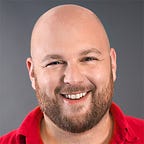Becoming Natural: My Journey to Citizenship
I’ve lived in the United States for 25 years.
Like many, I came here for grad school. Along the way, I had the privilege of meeting some amazing people, and living in a place that allowed me to preserve my “Canadian-ness”, my Jewishness and my Gayness mostly intact.
The years were filled with many complicated twists and turns — professional, personal and immigrational. The first 10 years were mostly characterized by low-grade immigration anxiety. Until you get your green card (and even afterwards — thanks, Trump) you live in constant fear that your life can be upended with every border crossing.
I’ve been eligible to become a citizen for over 10 years. But despite many questions from family, friends and border control agents, I rejected the idea. There were many rationalizations I used to explain my choices:
- I am Canadian. If you know anything about Canadians, the only thing we can agree on is that we are not American.
- The US would soon collapse and I’d need to flee. This is some deeply-felt Holocaust trauma. Throughout my childhood I would repeatedly ask my grandparents — all of whom survived the camps — why they didn’t just leave. They never had a good answer, other than they had no real idea how bad things would become until it was too late. This need to preserve options, to be ready to flee, would recur when my parents became refugees from communism in the 60s and 70s. I was brought up in a culture that believed things could always be worse, and to be suspicious of the good times. Living “between” spaces, under the radar, was an unconscious bit of self-preservation, and by being a foreigner, I counted on being expelled before bad things happened.
- The Option to live elsewhere. The US’ tax regime, and other regulations like FATCA, make being an American abroad a complicated — and expensive — matter. In essence, you are expected to pay both local and US taxes while living abroad, and are subject to byzantine banking regulations that make you an undesirable customer. I wanted to preserve the option of moving somewhere else, and this seemed smart.
- Political Objection. I have long objected to American jingoism and the shared delusions of military grandeur, moral righteousness and cultural superiority broadcast by the US government and key political figures. There was an element of “ugh” every time I’d see some patriotic jag unsupported by fact, and I had little interest in becoming part of that system. Plus, the political system in the US has really veered far from the “shining light on a hill” that pulled down the walls of Communism, and today would be unrecognizable to Reaganites, let alone the Founders.
But it was precisely this last point — and the advice of some sage experts — that pushed me over the edge the other way. I became a citizen on Feb 20, 2019, along with 3725 other new Americans in the cavernous Hall 1 of the LA Convention Center. Yes, I had to sit through an insane address from Donald Trump and a terribly-made music video of Lee Greenwood’s “God Bless the USA (I’m Proud to be an American).” But it was also a great moment for me (and I admit to humming one or two bars in the days since).
It started when Samantha Bee lectured me on her show about dodging my civic duty, and continued when my boyfriend Rich pushed me in a similar fashion. Thanks go out to both of them.
But it was the political process, the erosion of honesty, integrity and representation in US democracy that really spurred me to apply for — and get — my US citizenship. After the success of some political projects last year, I felt emboldened and empowered, and that political reform would be the greatest and most important challenge of my lifetime.
The gravest threats to our life, liberty and pursuit of happiness can be traced back to political failure and missed opportunity. Climate Change, Human Rights, Economic Opportunity, Automation, Killer Robots, Government Surveillance, Abusive Tech — just to name a few — require smart and clear political solutions if we are to avoid calamity.
In this regard, the US must lead. It starts with each one of us standing up and saying that we want to actively work to make this system better. That we believe in good, transparent and functional governance as a way of guaranteeing a future for our species.
I became a citizen because I want to be the change I’d like to see. I’m going to get more involved in political life (perhaps even run for office) and engage with the system from the privileged and powerful position of a citizen animated by hope. I have a set of gifts, and you do too — they must be applied to the challenges we face. Nothing is more important.
Politics is, indeed, the art of the possible. I never thought that I’d be here, 25 years later, still in my adopted homeland, a citizen. I look forward to the potential of the next 25, and thank all my friends and chosen family for their support and love.
While I blanche at the message of Greenwood’s nationalistic anthem, I do think there’s a great lyric in there that expresses how I feel at this very moment:
And I’d gladly stand up next to you
And defend Her still today
’Cause there ain’t no doubt
I love this land
God Bless the U.S.A.
nb: A weird thank you to Donald Trump and the other Republican Nazis. You motivated me (albeit negatively) to get more involved. Hopefully the millions of others like me will be your undoing. It would be my sincere pleasure to see you and all your cronies out of office/imprisoned/etc and the end of your vacuous and misguided ideology. Nothing excites me more right now. You should be worried.
